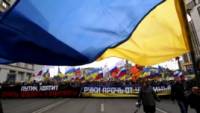Moscow’s fictitious “civil war in Ukraine”

At least three major surveys carried out over recent weeks have demonstrated that the supposedly imminent “civil war” that Ukraine is plunging into is an entirely artificial Russian construct. Not one of the surveys has shown any significant level of support for federalization or for parts of the country joining Russia. A majority do not want Russian to become a second state language.
The authoritative Razumkov Centre has just published the results of a survey it carried out together with the Rating Sociological Group from March 28 to April 2 in all regions, except the Crimea. It found that the majority of Ukrainian citizens support one State language; EU orientation and a unitary type of state. The only good news for Russia comes in the 45.9% opposition to joining NATO against 39.5% support.
Some of the results (of a hypothetical referendum):
71.4% would vote for Ukraine as a unitary state; 17.1% against;
16.3% would support federalization; 69.3% - a unitary system with decentralization of power;
Language
56.5% want Ukrainian to remain the sole official language against 37.6% who would be prepared to have two state languages.
54.5% would support joining the EU; 23.9% would be in favour of joining the Customs Union.
As mentioned, 35.8% would be in favour of joining NATO; 47.9% against.
Only 7.5% would be in favour of becoming part of the Russian Federation; 84.8% would be against this.
8.5% support the idea of their oblast joining Russia; 85.3% are against.
The results coincide with the findings of a survey carried out by Civic Watch; the Democratic Initiatives Foundation; and the EU-Ukraine Bridge in all regions, including the Crimea from March 16 to 30.
An absolute majority (89%) consider Ukraine to be their motherland. Only 8% support the idea of regions breaking away from Ukraine and joining another country. Even in Donbas [Donetsk and Luhansk regions] only 18% were in favour (against 0.5% in the West of Ukraine).
9.5% in southern Ukraine support the idea of south-eastern regions joining Russia; 11% in the east; and 27% in Donbas.
Only 6% of the population would like their oblast to secede from Ukraine and create its own independent state (the largest number were in Donbas – 17%; the least in the West – 2%).
All of the above tallies with a third study carried out by the International Republican Institute. In reporting the results, the authors note that “when asked what the status of Crimea should be, a majority in all regions said it should remain a part of Ukraine in some manner (West – 91 %, centre - 85%; South – 57%; East – 52%. This is in stark contrast to the 97 percent of voters who supposedly voted in support of the referendum to join Russia”.
IRI also found that a majority of Russian-speakers did not feel under threat.
A substantial survey carried out by the newspaper Dzerkalo Tyzhnya in the 8 oblasts which Vladimir Putin chose to call Novorossiya [“New Russia”], came up with a number of interesting results and it is hoped that the government will take notice. Two points only will be mentioned here: the survey found no real unity of thought at all, with only the Donbas region [Donetsk and Luhansk oblasts] tending to show results closer to those pushed by Russia.
Virtually half the population of all 8 oblasts [49.9%] doubt that Russia is justly defending the interests of Russian speakers in the south east. Only 32.6% were convinced of the opposite with the others answering that they didn’t know.
70% do not consider Viktor Yanukovych to be the lawful president and there was not one oblast where less than half considered him illegitimate. Dzerkalo Tyzhnya points out that in regions which for so many years demonstrated loyalty to Yanukovych and the Party of the Regions, only one in five considers him the legitimate president, against one in three for Oleksandr Turchynov and prime minister Arseny Yatsenyuk.
So what is Russia left with?
Unfortunately quite a lot: brute force and the money and professionals to provoke “separatist uprisings” in Donbas and the Kharkiv oblast and a massive propaganda machine which ploughs on, tank-like, trampling inconvenient facts in its path. And, most disastrously, western countries still unable to understand the danger of doing next to nothing to stop Moscow before it’s too late.





